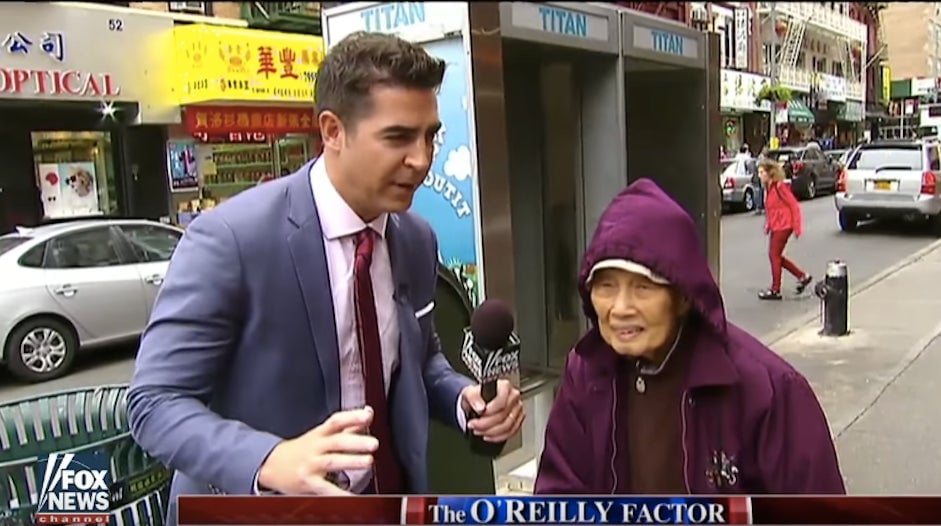Asian stereotypes persist across America because we are still viewed as foreigners in our own land
I’ve watched The O’Reilly Factor‘s “Chinatown” video segment several times now in order to try to understand why this clip in particular was so unsettling to me. After all, it’s not the first time tired, racist, or reductive stereotypes about Asian Americans have made it onto America’s airwaves. And yet this one struck a different chord.


I’ve watched The O’Reilly Factor‘s “Chinatown” video segment several times now in order to try to understand why this clip in particular was so unsettling to me. After all, it’s not the first time tired, racist, or reductive stereotypes about Asian Americans have made it onto America’s airwaves. And yet this one struck a different chord.
A lot of it has to do with where I am now, as opposed to where I used to be. As a Korean American living in South Africa, I became acutely aware of how imperative it is to do the long, hard work of de-colonizing our institutions. Just as importantly, we must awaken to the fact that our very identities are at the front lines of struggle. To decolonize our public spaces, in other words, we must first decolonize our minds. South Africa taught me that.
The immediate shock elicited by the boringly racist Jesse Watters has worn off by now, paving the way for some introspection. What conditions made it possible for such a segment to come into being? It’s certainly not an isolated problem—if you think such a clip could only air on a network like Fox News, you haven’t been paying attention to American cultural mores. In fact, no matter where you reside on the conservative-liberal spectrum, Asians remain a sort of “perpetual foreigner” in their own country.
I attribute this mainly to a wider failure of imagination with regards to what America is. In all arenas, American people of color have continued to battle against the normative dominance of the white, heterosexual male. We should all be proud of this effort as it expands the possibilities of what America can and should be.
But a lesser point—and I think at the crux of what bothered me most about the Watters segment—is the extent to which Asian voices are missing in this national conversation. I want to be careful here not to dismiss or discount the incredible and thankless work done by our Asian brothers and sisters in all fields—academia, media, journalism, activism, entertainment, and more. We really are indebted to them for the progress made so far.
But keeping this in mind, I’m speaking to a more general voicelessness of Asian communities in America. The English language, such as it is, and American culture, such as it is, mean that our parents and grandparents are simply trying to survive. I speak here only from my own experience as a Korean-American, of course, but the values implanted in me from a young age made sure I kept my head down, did not rock the boat, and focused solely on taking care of my own business. Even at an early age, the implications were clear: You’re in somebody else’s house, so take care not to make a mess. The Asian American universe is splendidly diverse, but I imagine that many of my friends and family can relate.
I think there is also something to be said about first-generation immigrants feeling this way. I can even understand how these values helped birth an entire generation of so-called “model minorities.” I’d even venture to say that for many of us, such a mentality has served us relatively well—at least economically. But when I consider how this Fox News segment was made possible, or how Bill O’Reilly and Jesse Watters so flippantly dismissed the anger of the Asian-American community as humorless overreaction, I can’t help but feel that our silent supplications over the years may have played a role.
If Watters had interviewed my father, there’s a good chance my father would not have known he was being made fun of. I imagine he would have laughed for the cameras, bowed when asked by this white man to bow. He might even have told him that yes, he does know karate, even though he doesn’t. Even though he’s Korean and not Japanese. I’m sure Watters would have laughed at my father; Watters would not have realized that this man in front of him was merely playing along, that he was simply being polite.
If permitted to speak in his own language, my father might have been able to articulate how much he’s had to sacrifice to build a life here in this country. He might have shared his sophisticated and nuanced opinions about the current election, or explained how he’s made to feel like an alien everyday and yet performs the duties of every other law-abiding American citizen. He could have told Watters’ audience about the jobs he’s created as a businessman or the two children he’s raised to become integral contributors and taxpayers. He could have had the opportunity, for the first time in his 36 years in America, to display his real and unique and flawed and wonderful personality.
But I also know that would never have happened. Watters would rather see my father as just another joke, just another plaything for his audience. A prop that can be used to lighten the political mood of “real” Americans.